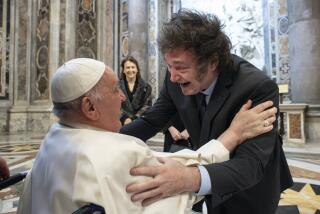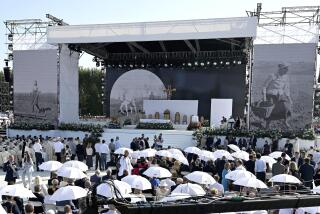Ex-Banking Heiress Earns Beatification From Pope
- Share via
--In a Mass in St. Peter’s Basilica in Rome, Pope John Paul II beatified Mother Katharine Drexel for her work in helping to overcome racial discrimination against American Indians and blacks. Mother Drexel, who died in 1955 at age 96, was a Philadelphia socialite born to one of the nation’s wealthiest banking families. She founded the order of the Sisters of the Blessed Sacrament to help Indians, blacks and Haitian immigrants and opened nearly 60 schools and missions. About 10,000 people attended the Mass, including Cardinals John Krol of Philadelphia and John J. O’Connor of New York, Archbishop Anthony Bevilacqua of Philadelphia and about 50 of Drexel’s relatives. “She seemed to grasp fundamental truths which many of her contemporaries failed to grasp,” the Pope said, “for example, the truth about the equal dignity and worth of every human being, regardless of race or ethnic origin.” Also attending the Mass was Robert Gutherman, 29, of Trenton, N.J., whose hearing was restored 14 years ago at a convent where the heiress-turned-nun spent her last days. The occurrence was certified by the church as a miracle, brought about through prayer for Mother Drexel’s intervention. However, a second miracle is needed for sainthood.
--Alexander Muchnik, 20, of Klaipeda in the Baltic republic of Lithuania, on Sunday traveled to the United States for a Tuesday appointment with a Boston doctor--in hopes of undergoing a bone-marrow transplant operation. Muchnik, a former paratrooper, is suffering from leukemia, and doctors have told him that his sister, Viktoria, 15, has the only bone marrow necessary for the transplant, which cannot be performed in the Soviet Union. Doctors there could only offer death without pain. Muchnik’s uncle, Ilya, a Moscow computer scientist, made the necessary medical contacts in Moscow, Amsterdam and the United States. But the family has raised only a few thousand dollars for the $100,000 operation.
--Andrei Sakharov, the Soviet physicist who is touring the United States, will help set the “Doomsday Clock,” a timely reminder of the tension among nuclear powers, the Bulletin of Atomic Scientists announced. “He was very pleased to be asked and had been interested in the Bulletin for some time,” said Bernard Feld, an MIT physicist and former editor of the Bulletin. Sakharov, a Nobel laureate, will help decide where to place the minute hand of the clock, which has been on the magazine’s cover since 1947. The minute hand is now at six minutes to midnight. The hand has been as distant as 12 minutes--and as near as two minutes.
More to Read
Sign up for Essential California
The most important California stories and recommendations in your inbox every morning.
You may occasionally receive promotional content from the Los Angeles Times.










